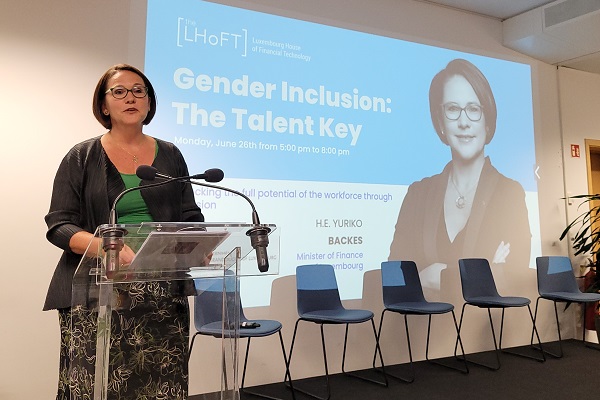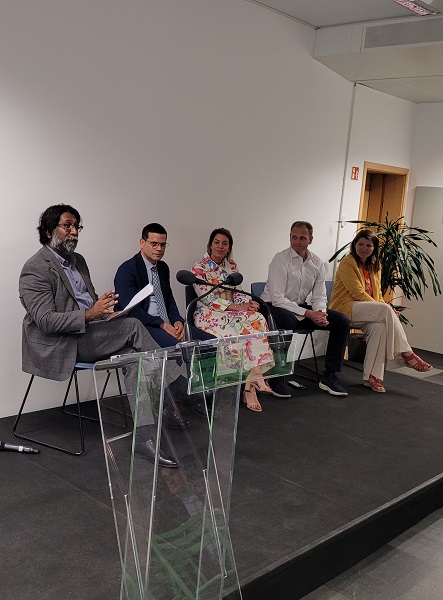 Yuriko Backes, Luxembourg's Minister of Finance;
Credit: Jazmin Campbell/Chronicle.lu
Yuriko Backes, Luxembourg's Minister of Finance;
Credit: Jazmin Campbell/Chronicle.lu
On the evening of Monday 26 June 2023, the Luxembourg House of Financial Technology (LHoFT) and KPMG unveiled their new report on gender inclusion at an event hosted at the former's premises in Luxembourg-Bonnevoie; this event was also an opportunity to announce a new pilot project at the Luxembourg Tech School (LTS).
Following an introduction by Master of Ceremonies Michael Fernando, Luxembourg's Minister of Finance and Chairwoman of the LHoFT, Yuriko Backes, delivered a speech in which she emphasised the need for concrete actions (such as the LTS pilot project announced later that evening). In addition to the social and justice-related arguments for gender inclusion, she highlighted the economic (and also ecological) arguments. She pointed out that times of crisis "cannot be an excuse" not to advance progress in this area. She highlighted two important aspects (plus concrete examples) of the gender strategy in Luxembourg: women in finance and financing women. Minister Backes described diversity and equity/equality as "vital catalysts for success" and emphasised the need to support women and give them platforms. She concluded that this new report would contribute to the discussion of how to collectively help empower women in the sector and hoped for further concrete action.
In his speech, LHoFT CEO Nasir Zubairi stressed the need for everyone to work together to drive inclusivity forward. He described the recruitment process as fundamental, highlighting for example the importance of using gender-neutral language in job advertisements. He added that inclusivity was above all about listening to people, not least those from (other) underrepresented groups, and concluded that businesses with diverse teams perform better than those with homogeneous teams.
Julie Castiaux (KPMG) and Oriane Kaesmann (LHoFT) then presented the new report "Gender Inclusion: The Talent Key", which focuses on the benefits of achieving gender parity for organisations as well as society as a whole. They noted that gender inclusion is not just a matter of "fairness" but also "a strategic necessity" in business. They particularly highlighted the efforts undertaken by PwC in the area of gender inclusivity, for instance through its "Aspire to Lead" initiative and "HeforShe" programme. Another example cited in the report was Accenture and its goal of achieving a gender-balanced workforce by 2025.
Despite a global increase in diversity, the representation of women in leadership roles remains low. And whilst the European Union (and particularly Luxembourg) emerged as "a trailblazer" in driving inclusion, there is still room for improvement, not least within the fintech sector. Citing figures from the European Women in Payments Network (EWPN), the report noted that only 29% of people working in fintech in Europe were women and the latter filled only 14% of executive committee roles and 7% of CEO positions. Despite having the smallest gender pay gap in the EU and certain "family-friendly policies" encouraging flexible working conditions, Luxembourg still suffers from certain gender representation disparities within its financial sector. Whilst 69.2% of banks have adopted a gender diversity policy, only 30.8% have set targets for gender representation. The report described the journey towards gender inclusion as "a work in progress, with much yet to be achieved". Among the persisting challenges are "unconscious bias" (e.g. in hiring and promotion processes) and work-life balance.
The report also pointed out some of the benefits of "tapping into the potential of an equal workplace", for example, according to a study by McKinsey, equal economic participation among women and men could increase the global annual GDP by $28 trillion (up 26%) by 2025. Some of the practical tips offered to organisations in this context included updating one's organisational framework, for example making it easier for women to return to work after maternity leave, identifying biases within one's organisation and creating, sharing and implementing a diversity strategy. Anther important step was creating more inclusive (unbiased) hiring processes. The report also highlighted the value of training programmes. The full report is available here.
The evening continued with the announcement of a new pilot project dedicated to inclusive talent at LTS. This joint initiative with the LHoFT comprises a mentorship programme for women who may not have a financial background but are looking to reskill and retrain professionally, as well as students with an interest in the sector. As Sara Kaiser, Programme Director at LTS, explained (via a pre-recorded video message), participants will receive individualised guidance. For this project to be successful, however, it relies on the support of companies who agree to mentor the participants with a view to potentially employing them at a later stage, noted Nasir Zubairi.
Sev Marcel, Director of Research and Insights at WildBrain and co-founder and co-host of the Your Day Your Rules Podcast, later delivered a keynote speech called "From Awareness to Action: Unlocking the Power of Gender Inclusion for Business Success". Sev noted the importance of identifying "key stakeholders with the power to effect change" as well as showing the "value of discomfort [related to change] to leaders". Like Minister Backes, she emphasised the need for concrete action and highlighted three main priorities for organisations: unlearning and relearning (e.g. biases and deep-rooted practices), creating a culture of accountability and redefining success metrics to promote gender equality.
The event continued with a panel discussion, moderated by Michael Fernando and featuring the following panellists: Stéphanie Noël, CEO of Victor Buck Services; Niccolo Polli, Sub-Regional CEO, Head of Strategy, Planning and Sustainability and CoS to the Europe CEO at HSBC; Julie Castiaux, Partner and Sustainability Lead at KPMG; Sergio Coronado, Lead Coach at LTS. The discussion touched on talent attraction and retention, the role of women in (leading) sustainable finance and flexible working conditions, among others.
Afterwards, attendees could stay to network over food and drinks.









